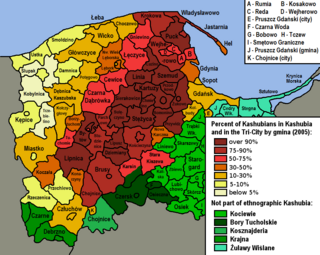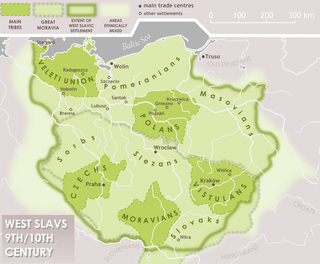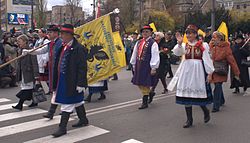
The Kashubians, also known as Cassubians or Kashubs, are a Lechitic ethnic group native to the historical region of Pomerania, including its eastern part called Pomerelia, in north-central Poland. Their settlement area is referred to as Kashubia. They speak the Kashubian language, which is classified as a separate language closely related to Polish.

Kashubian or Cassubian is a West Slavic language belonging to the Lechitic subgroup.

The Pomeranian language is in the Pomeranian group of Lechitic languages within the West Slavic languages.

Pomerania is a historical region on the southern shore of the Baltic Sea in Central Europe, split between Poland and Germany. The central and eastern part belongs to the West Pomeranian, Pomeranian and Kuyavian-Pomeranian voivodeships of Poland, while the western part belongs to the German states of Mecklenburg-Western Pomerania and Brandenburg.

Chojnice is a town in northern Poland with 38,789 inhabitants, as of June 2023, near the Tuchola Forest. It is the capital of the Chojnice County in the Pomeranian Voivodeship.

Bytów is a town in the Gdańsk Pomerania region of northern Poland with 16,730 inhabitants as of December 2021. It is the capital of Bytów County in the Pomeranian Voivodeship.

The Pomeranians, first mentioned as such in the 10th century, were a West Slavic tribe, which from the 5th to the 6th centuries had settled at the shore of the Baltic Sea between the mouths of the Oder and Vistula Rivers. They spoke the Pomeranian language that belonged to the Lechitic languages, a branch of the West Slavic language family.

Kashubia or Cassubia is an ethnocultural region in the historic Eastern Pomerania (Pomerelia) region of northern Poland.

Reda is a town on the Reda River in northern Poland, in the Kashubia region in Pomerania, with some 26,011 inhabitants. It is part of Wejherowo County, Pomeranian Voivodeship.

Brusy is a town in northern Poland, located in the Chojnice County in the Pomeranian Voivodeship. As of June 2023, the town has a population of 5,103.
Stanisław Pestka was a Kashubian poet. He was born in Rolbik. Pestka was also a translator of Russian texts into Kashubian language. He was the chairman of Kashubian-Pomeranian Association from 1976 to 1980 and again from 1992 to 1994. He was a Kashubian activist. He died in 2015.

Jan Alfons Wyrowiński is a Polish politician and Kashubian activist. He was the chairman of Kashubian-Pomeranian Association in the period 1994–1999.

Gdańsk Pomerania is the main geographical region within Pomerelia in northern Poland, covering the bulk of Pomeranian Voivodeship. In contrast to Pomerelia and its synonyms, the term does not cover the historical areas of Chełmno Land and Michałów Land, sometimes with the addition of Lubawa Land.

Aleksander Majkowski was a Polish-Kashubian writer, poet, journalist, editor, activist, and physician. He was the most important figure in the Kashubian movement before World War II, editor of Gryf, author of the greatest Kashubian novel The Life and Adventures of Remus, and Historia Kaszubów.
Rolbik is a village in the administrative district of Gmina Brusy, within Chojnice County, Pomeranian Voivodeship, in northern Poland. It lies approximately 11 kilometres (7 mi) north-west of Brusy, 26 km (16 mi) north of Chojnice, and 85 km (53 mi) south-west of the regional capital Gdańsk. It is located within the ethnocultural region of Kashubia in the historic region of Pomerania.

Sierakowice is a village in Kartuzy County, Pomeranian Voivodeship, Kashubia in northern Poland. It is the seat of the gmina called Gmina Sierakowice. It lies approximately 21 kilometres (13 mi) west of Kartuzy and 49 km (30 mi) west of the regional capital Gdańsk. Kashubian is here in official use, as a regional language or an auxiliary language. This means that in principle, it is possible to address gmina's administration in Kashubian and receive an answer in the same language. In Sierakowice, roads direction signage is bilingual Polish/Kashubian. Kashubian vetch is native to the village. Kashubian vetch means vetch of Kashubia, the home of Kashubs.
The Society of Young Kashubians was an association founded in 1912 in Gdańsk (Poland). Its leader was Dr. Aleksander Majkowski, already a well-known Kashubian writer and author of The Life and Adventures of Remus. Other influential members of the association were the attorney Jan Karnowski and two Roman Catholic priests, Leon Heyke and Józef Wrycza.

The Pomeranian Griffin secret military organization was a Polish anti-Nazi resistance group active in Pomerania and East Prussia during World War II. A major Polish resistance organization in the Pomerania region, at its height in 1943 it might have had as many as 20,000 members, although only about 500 were active partisans in the forests (leśni).

The Kashubian Association is a Poland-based association for Kashubians with the aim of developing the national, civic and cultural awareness of Kashubians from around the world. In particular, it is calling for recognizing the Kashubian as an ethnic minority in Poland: in the current Polish law on minorities, the only right the Kashubians enjoy is the status of their language as regional.

Kashubian literature appeared in Poland during the second half of the nineteenth century with Florian Cejnowa (1817–1881), who used the Sławoszyno dialect of the Puck region, and Hieronim Derdowski (1852–1902), who used the Wiele dialect of the Chojnice district. The latter enriched Kashubian literature especially in poetry.


















